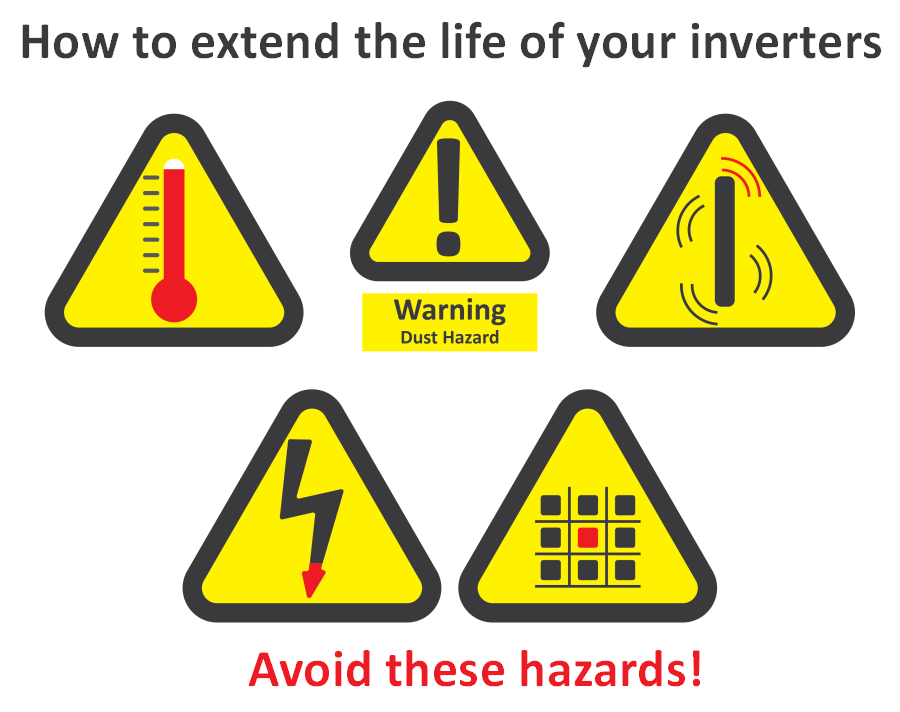How to Extend the Life of Your Inverters
Inverters are inherently reliable devices. They are costly pieces of power electronics and warrant some care. The only moving part in an inverter is the cooling fan, all other components being static electronic components. With careful consideration at the design / installation stage, inverters can operate in a variety of environments successfully for many years. IDS have designed and installed inverter installations for underground use in coal mines which have been in use for well over 10 years. It is not unusual to come across well installed ABB inverters that are happily running and over 20 years old!
How to Extend the Life of Your Inverters
So how do we make sure you get the design life out of your inverters? It falls into five simple categories:
-
Temperature
The power semiconductors within the inverter (input diodes and output transistors) all like to be cool. In fact, if you increase the temperature of the semiconductors by 10⁰C it reduces their life by 50%.
The inverter should be kept in an environment below its rated temperature (usually 40⁰C or 50⁰C) by making sure there is adequate cool air around the drive, whether it is on a wall or in a panel. This may involve regular changes of inlet filters in dusty environments. This will also mean the regular inspection and cleaning of the inverter’s heatsinks and replacement of the cooling fans every few years (typically 3 years).
There is another way of reducing an inverter’s temperature rise and that is to oversize the inverter. This means that the inverter’s cooling system is ‘over designed’ and will therefore keep the inverter cooler. The other side of this coin is if the inverter is running near its rated current or it receives regular overloads, it can become warmer and have a reduced life.
-
Dust and Corrosive Gases
Dust, especially conductive dust (metal or carbon dust for example) must be kept out of the delicate electronic parts of the drive.
This is designed in to any inverter installation by choosing an inverter with the correct Ingress Protection (IP) rating or designing correct enclosures for the inverters. It is all a matter of considering the environment and protecting the drive appropriately.
One neat solution is to mount the heatsink and fan in the dusty air and have the more sensitive electronics in its own clean environment.
For more information on Ingress Protection please see abb.com.
Corrosive gasses are more difficult and it is usual to remove any form of electrical equipment away from the corrosion and in clean air. Many of ABB’s inverters have coated PCBs (boards) which help with harsher environments.
-
Vibration
No electronic components last long if shaken around. Inverters should not be mounted on vibrating machines for example. If the vibrations cannot be avoided (e.g. ships and trains) then some form of vibration isolation should be used like rubber vibration dampers.
-
Voltage Surges
This form of damage to inverters is less frequent and more difficult to protect against. They come from upstream switching events and lightning strikes. Inverters can absorb a certain amount of excess voltage in the capacitors, but there is a limit.
-
Lack of Use
If an inverter is not powered up for typically one year, the insulation inside the capacitors within the drive starts to degrade. This is not a permanent problem however and we at IDS have a capacitor conditioner that will refresh the capacitor’s insulation.
How to Extend the Life of Your Inverters Summary
With a little bit of thought at the design / installation stage inverters will have the potential of a long and useful life. Looking after the inverters with proper servicing will ensure the inverters’ longest life possible. We at IDS would be pleased to help you with both of these things as well as any other inverter requirements you have. For all inverter enquiries please contact us 0115 944 1036 or email [email protected]


